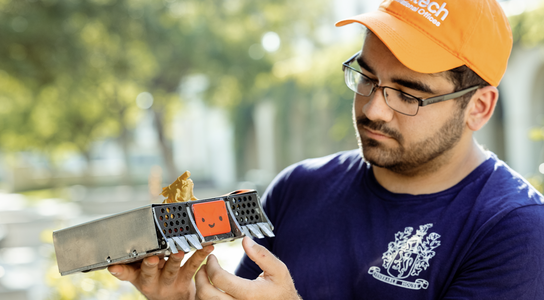
Techers call majors “options.” Which is fitting, considering how many you'll have no matter which you choose.

Related Pages

After you leave Caltech, you’ll work with many people who will inspire you, and whose own excellence pushes you to go farther yourself. Here, though, you'll have the once-in-a-lifetime opportunity to tap the knowledge of world-class faculty who are dedicated to making you better. Some of our faculty have won the biggest prizes in their fields and still more conduct research that changes the world. They teach here because the biggest contribution they’ll make to the future is you.
Image Lightbox 
Nine out of ten Caltech students conduct research while here, regardless of their major. You may work at the Jet Propulsion Laboratory or Laser Interferometer Gravitational-Wave Observatory, or participate in an exchange program in China or Iceland. And you don’t need prior experience: With at least one Ph.D.-level researcher for every Caltech undergraduate, you’ll learn the ropes quickly enough.
Image Lightbox 
Farther down this page, you’ll see a list of majors. One of them might be exactly what you’ve always wanted to study. Which is great! But you might not want to study it at Caltech. We’re built to work best for students who aren’t afraid of getting in over their heads, and whose curiosity and vision reach farther than what can be achieved today.
Image LightboxThere are not many places like Caltech where students can learn from experts from so many different fields in a natural way.
Jakša CvitanićRichard N. Merkin Professor of Mathematical Finance; Director, Ronald and Maxine Linde Institute of Economic and Management Sciences
Caltech is split into six academic divisions. You'll take classes in each as part of our core curriculum, which emphasizes learning across disciplines. Our job is to make you the best scientist you can possibly become, and the core begins that journey. So a physics student will take biology classes, and a biology student will take a class in econ, poli sci, or literature.
Every first-year student at Caltech takes the same classes during their first two terms; you won't even declare your major until the end of your first year. The core curriculum is the bedrock that lies beneath all of your upper-level courses. All of the incredibly challenging STEM work in core opens the door to everything that follows.
But the core is about much more than STEM. You'll discover that the humanities and social sciences are inextricably linked to what you can achieve in science and engineering. On one hand, those subjects shed light on the societal challenges we need STEM to solve. On the other, they provide the real-world context for how much we can expect technology to accomplish—because the solutions we create are ultimately used in society, not the lab.
* The Interdisciplinary Studies Program (ISP) is an undergraduate option that allows the student to create their own scholastic requirements, under faculty supervision, and to pursue positive educational goals that cannot be achieved in any of the other available options. More information is available on the Caltech Catalog.